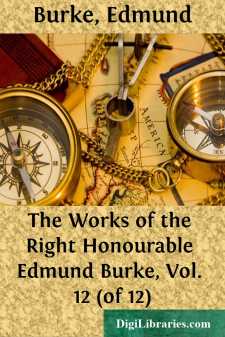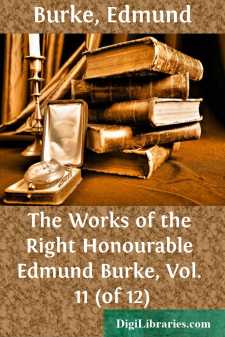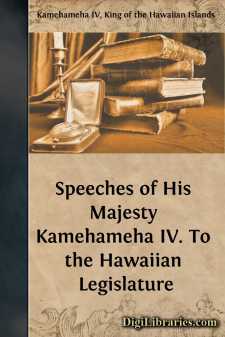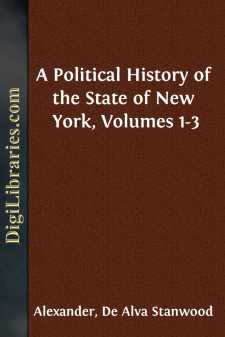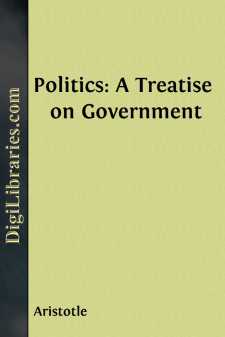Political Science
- Conspiracy & Scandal Investigations 1
- Constitutions 7
- Economic Conditions 10
- General
- Government 6
- History & Theory 132
- Peace 1
General Books
Sort by:
by:
Edmund Burke
SPEECH ON THE ACTS OF UNIFORMITY FEBRUARY 6, 1772. The following Speech was occasioned by a petition to the House of Commons from certain clergymen of the Church of England, and certain of the two professions of Civil Law and Physic, and others, praying to be relieved from subscription to the Thirty-Nine Articles, as required by the Acts of Uniformity. The persona associated for this purpose were...
more...
by:
Edmund Burke
FOURTH LETTER ON THE PROPOSALS FOR PEACE WITH THE REGICIDE DIRECTORY OF FRANCE. ADDRESSED TO THE EARL FITZWILLIAM. 1795-7. Letter from the Right Honorable the Lord Auckland to the Lord Bishop of Rochester. EDEN FARM, KENT, July 18th, 1812. My dear Lord,—Mr. Burke's fourth letter to Lord Fitzwilliam is personally interesting to me: I have perused it with a respectful attention. When I...
more...
by:
Edmund Burke
SPEECH IN GENERAL REPLY. FIFTH DAY: SATURDAY, JUNE 7, 1794. My Lords,—We will now resume the consideration of the remaining part of our charge, and of the prisoner's attempts to defend himself against it. Mr. Hastings, well knowing (what your Lordships must also by this time be perfectly satisfied was the case) that this unfortunate Nabob had no will of his own, draws down his poor victim to...
more...
by:
Edmund Burke
SPEECH IN OPENING THE IMPEACHMENT. THIRD DAY: MONDAY, FEBRUARY 18, 1788. My Lords,—The gentlemen who are appointed by the Commons to manage this prosecution, have directed me to inform your Lordships, that they have very carefully and attentively weighed the magnitude of the subject which they bring before you with the time which the nature and circumstances of affairs allow for their conducting it....
more...
by:
Edmund Burke
REPORT Made on the 30th April, 1794, from the Committee of the House of Commons, appointed to inspect the Lords' Journals, in relation to their proceeding on the trial of Warren Hastings, Esquire, and to report what they find therein to the House (which committee were the managers appointed to make good the articles of impeachment against the said Warren Hastings, Esquire); and who were afterwards...
more...
PROCLAMATION. Whereas, It has come to my knowledge from the highest official sources, that my Government has been recently threatened with overthrow by lawless violence; and whereas the representatives at my Court, of the United States, Great Britain and France, being cognizant of these threats, have offered me the prompt assistance of the Naval forces of their respective countries, I hereby publicly...
more...
by:
Valentine Chirol
CHAPTER I THE CLASH OF TWO CIVILISATIONS On February 9, 1921, three hundred and twenty-one years after Queen Elizabeth granted to her trusty "Merchant-venturers" of London the charter out of which the East India Company and the British Empire of India were to grow up, His Royal Highness the Duke of Connaught inaugurated at Delhi, in the King-Emperor's name, the new representative...
more...
CHAPTER I There are some who would dispute the greatness of Parnell—who would deny him the stature and the dignity of a leader of men. There are others who would aver that Parnell was made by his lieutenants—that he owed all his success in the political arena to their ability and fighting qualities and that he was essentially a man of mediocre talents himself. It might be enough to answer to these...
more...
PREFACE The preparation of this work was suggested to the author by the difficulty he experienced in obtaining an accurate knowledge of the movements of political parties and their leaders in the Empire State. "After living a dozen years in New York," wrote Oliver Wolcott, who had been one of Washington's Cabinet, and was afterwards governor of Connecticut, "I don't pretend to...
more...
by:
Aristotle
The Politics of Aristotle is the second part of a treatise of which the Ethics is the first part. It looks back to the Ethics as the Ethics looks forward to the Politics. For Aristotle did not separate, as we are inclined to do, the spheres of the statesman and the moralist. In the Ethics he has described the character necessary for the good life, but that life is for him essentially to be lived in...
more...




